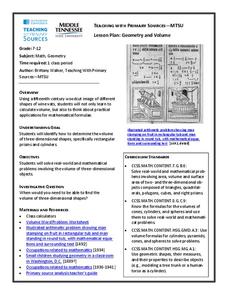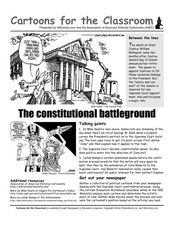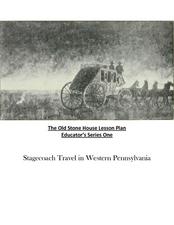Wind Wise Education
Understanding Forms and Sources of Energy
What is the difference between a form of energy and a source of energy? This first activity in a series of 19 lessons uses demonstrations and discussions to introduce energy to the class. Through using hand-generator flashlights,...
K12 Reader
Two Viewpoints of the Same Event: Lee Surrenders to Grant, 1865
How did Union General Ulysses S. Grant view the surrender of Confederate General Robert E. Lee in 1865, which effectively ended the United States Civil War? After reading an excerpt from Grant's autobiography, your young historians will...
K12 Reader
Summarize It: President Theodore Roosevelt's 7th Annual Message to Congress
How did Theodore Roosevelt stress the importance of conservation during his time as president of the United States? Take a closer look at the language Roosevelt used himself in a 1907 address to Congress, and have your young...
Middle Tennessee State University
The Invention of the Telephone
All of the people in your class would agree that life would be different without the invention of the telephone! Study Alexander Graham Bell's most famous and influential invention through the primary source document of his...
K12 Reader
Find the Meaning: JFK's Inaugural Speech
Analyze a seminal speech from the 20th century with an activity focused on President John F. Kennedy's inaugural address. After reading an excerpt from the address, pupils use a worksheet to practice their reading...
PBS
Democracy in Action: Freedom Riders
This is a must-have resource for every social studies teacher covering the civil rights movement. Through an engaging video and detailed viewing guide, young historians learn about the Freedom Riders, and discover how everyday...
Virginia Department of Education
Geometry and Volume
The history of math is fascinating! Utilize a woodcut primary source image from 1492 and posters from the 1930s to help geometers apply their volume-calculation skills to real-life questions.
Smithsonian Institution
Mary Henry: Journal/Diary Writing
A great way to connect social studies with language arts, a resource on Mary Henry's historical diary reinforces the concepts of primary and secondary sources. It comes with an easy-to-understand lesson plan, as well as the reference...
K12 Reader
Churchill's Speech: We Shall Fight on the Beaches
Winston Churchill speech delivered to the House of Commons on June 4, 1940, is the focus of a comprehension exercise that asks readers to explain how the repetition in the speech supports the main purpose of Churchill's address.
Society of Petroleum Engineers
Renewable and Nonrenewable Energy
Energize an environmental science unit on natural resources with this collection of instructional materials. From simple coloring sheets for primary grade children, to guiding questions for a high school research...
Smithsonian Institution
Solomon G. Brown: Letter Writing
Personal correspondence in the form of letters is not as common as it once was. This resource presents an opportunity for you to introduce your class to letter writing and cover topics in social studies. Learners read a letter written in...
Curated OER
Cartoons for the Classroom: Presidential Candidates
Build critical analysis skills with this cartoon for the classroom. Upper graders answer three critical thinking questions to help them analyze a political cartoon, which depicts how Presidential Candidates are judged and chosen. Put...
K12 Reader
Different Perspectives: The American Revolution
Prompt your young historians to hone in their reading comprehension skills by considering the fascinating perspective that Rudyard Kipling offers in his poem, "The American Rebellion", which provides an alternative...
Curated OER
Cartoons for the Classroom: The Constitutional Battleground
For this primary source analysis worksheet, students analyze political cartoons about the Supreme Court and Constitutional issues and respond to 5 talking point questions.
Curated OER
Cartoons for the Classroom: Censorship, Silencing an Anti-War Voice
In this primary source analysis worksheet, students analyze political cartoons with anti-war messages and respond to 5 talking point questions.
K12 Reader
Abigail Adams: Persuading Her Husband
After reading a brief excerpt from a letter written by Abigail Adams to her husband and future president of the United States, John Adams, your young historians will practice their reading comprehension skills and identify what Abigail...
K12 Reader
What's the Purpose? FDR's Pearl Harbor Speech
FDR's December 7, 1941 address to the nation is the focus of a reading comprehension exercise that asks middle schoolers to read an excerpt from the Pearl Harbor speech and determine the president's purpose.
Curated OER
Old Stone House Lesson Plan
From stagecoach to railroad tracks, your class will discover how advancements in travel in the United States during the nineteenth century played an integral role in the industrialization and development of American society. The main...
Curated OER
The Boston Tea Party
In this digital archive worksheet, learners examine a painting that depicts the Boston Tea Party. This worksheet may be used in a variety of classroom activities.
Curated OER
Water Sources: Sprinkles (Newsletter)
In this science worksheet, students investigate water sources and the environment. Students complete a rebus, a home water survey, a game about the journey of water, an activity on waste water, a water cleansing experiment and a water...
Shmoop
ELA.CCSS.ELA-Literacy.RI.9-10.6
What does the author believe about his topic? Why did he write in the first place? Challenge your class to figure out the answers to these questions as they read through informational texts. The resource provides a breakdown of the...
North Carolina School of Science and Mathematics
Henry Kissinger and Detente
How did relations between the United States and the People's Republic of China evolve between 1950 and 1970? Your young historians will complete a timeline of events with evidence that the relationship between these two great...
Curated OER
The Treaty of Versailles: The League of Nations Student Worksheet
In this world history instructional activity, students read a 1-page selection as well as Internet articles about the Treaty of Versailles and the League of Nations and then respond to 8 short answer questions.
University of Georgia
Splat!
What does viscosity have to do with splatter? An activity shows that the viscosity of a substance is inversely proportional to the distance of its splatter. Learners conduct the experiment by collecting data, graphing, and analyzing...























